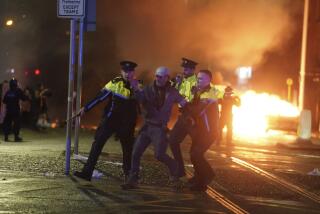Militants Go on Rampage Over Dublin Role in Ulster
- Share via
BELFAST, Northern Ireland — Protestant militants hurled gasoline bombs and stones in a rampage Monday through central Belfast, and violent protests hit Londonderry and other towns during a 24-hour general strike to demonstrate opposition to a voice for Dublin in the British-ruled province.
At least 10 people were injured, eight vehicles were set on fire and a clothing factory went up in flames in the most violent and widespread protest so far against the Nov. 15 Anglo-Irish accord.
The agreement gives the predominantly Roman Catholic Irish Republic a consultative role in Northern Ireland, where there is a 3-2 Protestant majority. Protestants say the accord violates British sovereignty and threatens to make them second-class citizens.
In Londonderry, Protestant and Catholic youths battled, and officers fired plastic bullets when a police van was attacked.
The Protestants cut electric power to hundreds of homes and managed to virtually paralyze the province, known as Ulster, during the strike. The Royal Ulster Constabulary said 34 people were arrested in violent incidents.
Among the injured were four policemen and two women who were hurt by stones during an incident at the Saracen clothing factory in Lurgan, 15 miles southwest of Belfast. The factory was seriously damaged by a fire that broke out after the 200 workers left under police escort to protect them from a mob of about 500 Protestant pickets.
The two women were hurt when Protestant strike supporters hurled bricks into the factory. The 200 workers were trapped inside until they were led to safety by police. Flames shot up from the factory minutes later. One of the four policemen who were hurt suffered a serious eye injury.
The homes of three policemen were attacked, and several people said strikers stoned their cars.
After a rally at Belfast City Hall, militants in the crowd broke away to start burning cars and breaking windows in the main business district. Police, firefighters and soldiers moved in to disperse the rioters.
The strike kept an estimated 85% of the work force away from Northern Ireland’s three biggest employers. Some supported the strike, but others complained of intimidation and roadblocks that included oil and nails strewn across the main highway south of Belfast.
Protestant leaders had called for a peaceful 24-hour strike in the province to protest the Anglo-Irish agreement, but violence broke out shortly after the strike began at midnight Sunday.
“There has been very significant disruption to the province today, and it has done great damage to the image of the province,” said Tom King, Britain’s secretary for Northern Ireland, who had urged people to ignore the strike.
Strike Called Success
Peter Robinson, deputy leader of the hard-line Protestant Democratic Unionist Party, called the strike a success, saying it had widespread support.
Protestants accuse British Prime Minister Margaret Thatcher of ignoring their special election vote on Jan. 23 in favor of scrapping the Anglo-Irish accord.
The Protestants maintain this is the first step in a process that will eventually put them under Dublin’s rule.
Thatcher has remained adamant that Britain will not cancel the agreement. King called the strike “a pointless gesture” that will have no influence on the government.
More than 5,000 Protestant supporters attended a mock funeral for democracy at Belfast City Hall, complete with four coffins draped with Britain’s Union Jack.
Robinson said Thatcher was on trial for murdering democracy and asked the crowd to be the jury. “Guilty!” roared the crowd.
No Power for ‘Chair’
“In passing sentence I would have liked to have suggested the electric chair but for the power cuts today,” Robinson said. The crowd cheered.
In Dublin, aides to Irish Prime Minister Garret FitzGerald said he believes the strike will not deter Thatcher.
Across the province, strike supporters used tractors, farm machinery, telephone poles, fallen trees, nails, burning rubbish and human chains to block roads.
Many schools were closed. Ferries to Scotland and England were canceled, and Belfast International Airport closed at midday.
The province’s three largest employers--the Harland and Wolff shipyard, the Short Brothers aircraft manufacturer and the Gallaher tobacco company--said that 10% to 15% of their staff reported to work.
Banks, post offices and many stores in Belfast opened in the morning but closed at lunchtime.
More to Read
Sign up for Essential California
The most important California stories and recommendations in your inbox every morning.
You may occasionally receive promotional content from the Los Angeles Times.













